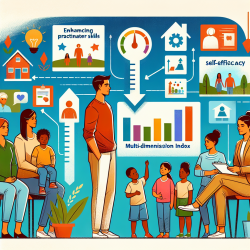Introduction
In the realm of speech-language pathology and child development, evidence-based programs (EBPs) are pivotal in ensuring positive outcomes for children and families. The research article titled "Measuring and Predicting Service Providers’ Use of an Evidence-Based Parenting Program" provides valuable insights into the factors influencing the implementation of such programs. This blog aims to guide practitioners in enhancing their skills by leveraging the outcomes of this research, thereby fostering better implementation of EBPs.
Understanding the Research
The study examined the predictors of service providers' use of the Triple P—Positive Parenting Program, a multi-level EBP aimed at improving parenting skills and child outcomes. Key findings highlighted that providers' self-efficacy and the amount of training received were significant predictors of EBP usage. Additionally, the community context played a role in determining the extent of program implementation.
Key Takeaways for Practitioners
- Emphasize Training: The study underscores the importance of comprehensive training across multiple levels of an EBP. Practitioners should seek opportunities to enhance their skills through additional training sessions, which can increase the likelihood of program usage.
- Boost Self-Efficacy: Confidence in delivering EBPs is crucial. Practitioners should engage in activities that build their self-efficacy, such as peer support groups and mentorship programs.
- Consider Community Context: Understanding the community's characteristics and resources can aid in tailoring the implementation process to better fit the local context, thereby enhancing program uptake.
Encouraging Further Research
The findings from this study open avenues for further research into the factors affecting EBP implementation. Practitioners are encouraged to explore additional variables, such as organizational support and the role of community partnerships, to gain a more comprehensive understanding of the implementation process.
Conclusion
By applying the insights from this research, practitioners can improve their implementation of EBPs, ultimately leading to better outcomes for children and families. Continuous learning and adaptation to community needs are essential for successful program delivery.
To read the original research paper, please follow this link: Measuring and Predicting Service Providers’ Use of an Evidence-Based Parenting Program.










